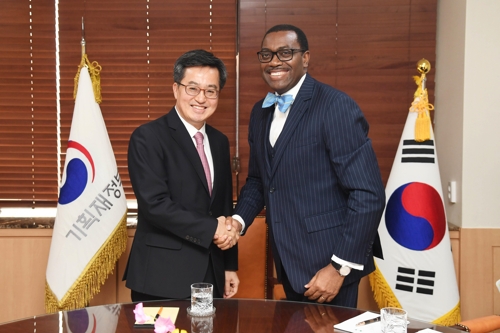
The insufficient level of information and communication on investment opportunities in Africa has been identified as a challenge requiring urgent attention.
President of the AfDB, Dr Akinwumi Adesina, disclosed this on Thursday.
He said this when a delegation from the bank visited the Deputy Prime Minister and Minister of Strategy and Finance of Korea, Kim Dong Yeon, in Seoul.
According to him, only 15 per cent of Africa’s trade is internal, adding that one of the bank’s key agenda, integrating Africa, is essential for the rapid movement of people, goods and services.
Adesina earlier hosted members of Africa’s Diplomatic Community in Seoul to a dinner reception.
He stressed the importance of the Bank’s African Investment Forum scheduled for November, stating that Africa was open for business and that the forum would be ‘short on talk’ and ‘high on transactions and project pipelines’.
Kim said that the meetings would provide Korea with an opportunity to deepen relationships with the bank, African Governments and the private sector.
According to him, as part of a larger strategic engagement with Africa, Korea is interested in developing a Tech Corp human exchange.
He added that Korea was also interested in learning platform that would provide talented young Korean professionals with opportunities to serve in the public and private sector of the bank’s member nations.
‘‘Aside from the 2017 Winter Olympics, the annual meeting of the bank this May in Korea, is the most important event on our calendar,” Kim said.
Mayor Suh Byung-soo of Busan, said Korea’s technologically innovative `smart city’ was highly interested in a Korea-Africa business forum that would open up doors for investment and development in Africa.
Mr Eung-Soo, Chairman and President of the Korea EXIM Bank, said ‘‘if the bank in conjunction with others, can help de-risk investments and stabilize local currencies and exchanges rates, and continue commitments to regulatory and policy reforms, there will be significant Korean investments on the continent”.
Lee Kang-rae, President, Korea Expressway Corporation, highlighted Korea’s Cooperative Intelligent Transportation System, a national road network using a combination of CCTV, data, cloud computing, drones and real time simulation, to create an efficient road network.
Lee added that the corporation collected close to 4 billion dollars in tolls in 2017.
The bank team also visited Silla University, where school President Park Tae-Hak , took the delegation on a tour of the country’s largest drone testing site and the university’s live simulation centre.
Silla is at the forefront of Korea’s industrial drone technology and the development of platforms supporting artificial intelligence, robotics and Busan’s dynamic transition into a knowledge economy.
Busan will host the Annual Meetings of the bank from May 21 to 25.









